Fleurs du Mal Magazine


Or see the index
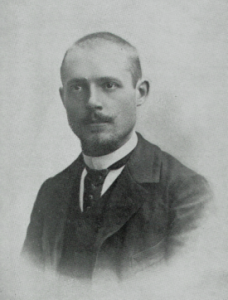
Paris double galère
Depuis le Point-du-Jour jusqu’aux cèdres bibliques
Double galère assise au long du grand bazar,
Et du grand ministère, et du morne alcazar,
Parmi les deuils privés et les vertus publiques ;
Sous les quatre-vingts rois et les trois Républiques,
Et sous Napoléon, Alexandre et César,
Nos pères ont tenté le centuple hasard,
Fidèlement courbés sur tes rames obliques.
Et nous prenant leur place au même banc de chêne,
Nous ramerons des reins, de la nuque, de l’âme,
Pliés, cassés, meurtris, saignants sous notre chaîne ;
Et nous tiendrons le coup, rivés sur notre rame,
Forçats fils de forçats aux deux rives de Seine,
Galériens couchés aux pieds de Notre Dame.
Charles Péguy
(1873 – 1914)
Paris double galère
1913
• fleursdumal.nl magazine
More in: # Classic Poetry Archive, Archive O-P, Archive O-P, FDM in Paris, Peguy, Charles, WAR & PEACE

Les regrets
Justine est seule et gémissante,
Et mes yeux avec intérêt
La suivent dans ce lieu secret
Où sa chute fut si touchante.
D’abord son tranquille chagrin
Garde un morne et profond silence :
Mais des pleurs s’échappent enfin,
Et coulent avec abondance
De son visage sur son sein ;
Et ce sein formé par les Grâces,
Dont le voluptueux satin
Du baiser conserve les traces,
Palpite encore pour Valsin.
Dans sa douleur elle contemple
Ce réduit ignoré du jour,
Cette alcôve, qui fut un temple,
Et redit : Voilà donc l’Amour !
Évariste de Parny
(1753-1814)
Les regrets
Poésies fugitives (1787)
• fleursdumal.nl magazine
More in: # Classic Poetry Archive, Archive O-P, Archive O-P
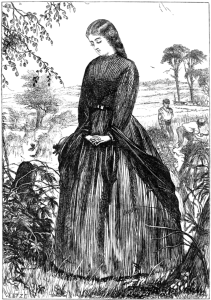
Among the sheaves
I
Among the sheaves—the golden sheaves,
An empty heart, I walk forlorn:
How sadly sigh the alder leaves—
I loathe those fields of mellow corn!
II
Among the sheaves—the golden sheaves,
My heart is full, new hopes are born:
My heart is faint—for Hope deceives:
My passion may be met by scorn!
III
Among the sheaves—the golden sheaves,
My Love is won! No more forlorn,
How sweet the whisp’ring alder leaves—
I bless those fields of mellow corn!
Evelyn Forest
(Pen name of Anne Pares)
( … – … unknown)
Among the sheaves
Illustration: Frederick Eltze (1836–1870)
• fleursdumal.nl magazine
More in: # Classic Poetry Archive, Archive E-F, Archive E-F, Archive O-P, Archive O-P

Ach Liebste, lass uns eilen
Ach Liebste, lass uns eilen,
Wir haben Zeit:
Es schadet das Verweilen
Uns beiderseit.
Der edlen Schönheit Gaben
Fliehn Fuß für Fuß,
Dass alles, was wir haben,
Verschwinden muß.
Der Wangen Zier verbleichet
Das Haar wird greis,
Der Äuglein Feuer weichet,
Die Brunst wird Eis.
Das Mündlein von Korallen
Wird ungestalt,
Die Händ als Schnee verfallen,
Und du wirst alt.
Drum lass uns jetzt geniessen
Der Jugend Frucht,
Eh denn wir folgen müssen
Der Jahre Flucht.
Wo du dich selber liebest,
So liebe mich,
Gib mir, dass, wann du gibest
Verlier auch ich.
Martin Opitz
(1597 – 1639)
Ach Liebste, lass uns eilen
• fleursdumal.nl magazine
More in: # Classic Poetry Archive, Archive O-P, Archive O-P

Quatrains
Cœur dur comme une tour,
Ô cœur de pierre,
Donjon de jour en jour
Vêtu de lierre.
De tous liens lié
A cette terre,
Ô cœur humilié,
Cœur solitaire.
Cœur qui as tant crevé
De pleurs secrets,
Buveur inabreuvé,
Cendre et regrets.
Cœur tant de fois baigné
Dans la lumière,
Et tant de fois noyé
Source première.
Ô cœur laissé pour mort
Dans le fossé,
Cœur tu battais encore,
Ô trépassé.
Ô cœur inexploré,
Vaste univers,
Idole décorée,
Jardin d’hiver.
Ô vase de regret
Plein jusqu’aux bords
Du venin d’un remords
Inespéré…
Ô vieil arbre écorcé,
Rongé des vers,
Vieux sanglier forcé,
Ô cœur pervers…
Cœur qui as tant saigné
D’amour, de haine,
Ô cœur mal résigné
De tant de peine.
Cœur tant de fois flétri
Au dur labeur,
Cœur tant de fois fleuri
Aux soirs de mai…
Cœur tant de fois forgé
Sous le marteau,
Cœur tant de fois crevé
Sous le couteau…
Cœur qui a tant rêvé,
Ô cœur charnel,
Ô cœur inachevé
Cœur éternel.
Cœur qui a tant battu,
D’amour, d’espoir,
Ô cœur trouveras-tu
La paix du soir…
Cœur tant de fois pétri,
Ô pain du jour,
Cœur tant de fois meurtri,
Levain d’amour.
Cœur qui a tant battu,
D’amour, de haine,
Cœur tu ne battras plus
De tant de peine.
Cœur dévoré d’amour,
Te tairas-tu,
Ô cœur de jour en jour
Inentendu…
Cœur plein d’un seul regret
Poignant et bref,
Comme un unique fret
Charge une nef.
Cœur plein d’un seul regret
Poignant et sourd,
Comme un fardeau trop lourd
Charge une nef.
Cœur vaisseau démarré
A charge pleine,
Vaisseau désemparé
De sa misaine.
Cœur plein d’un seul amour,
Désaccordé,
Ô cœur de jour en jour
Plus hasardé…
Dans ce noble séjour,
Cœur attardé,
Plein d’un secret si lourd,
Mur lézardé…
Ô cœur exténué,
Péri d’amour,
Ô cœur de jour en jour
Destitué…
Ô peine aux longs cheveux
Couchée au lit
De l’homme que tu veux
Enseveli.
Ô peine aux longs cheveux
Couchée au long
De l’homme juste et bon
Au même lit.
Enseveli sois-tu
Dans cet amour
Et dans cette vertu
Et cette tour.
Loué sois-tu, cœur frêle,
Pour ta rudesse,
Loué sois-tu, cœur grêle,
Pour ta tristesse.
Pour tes renoncements,
Ô dépouillé,
Pour tes abaissements,
Ô cœur souillé.
Cœur tant de fois cloué
Au dur gibet,
Tant de fois bafoué
De quolibets.
Et pardonné sois-tu,
Notre cœur, vil,
Au nom des Trois Vertus,
Ainsi soit-il.
Tu avais tout pourvu,
Ô confident,
Tu avais tout prévu,
Ô provident.
Tu avais tout pourvu,
Fors d’une fièvre,
Tu avais tout prévu,
Fors que deux lèvres…
Tu avais tout pourvu,
Fors une flamme,
Tu avais tout prévu,
Fors une autre âme.
Tu avais fait ton compte,
Ô prévoyant,
Tu n’avais oublié
Qu’un cœur battant…
Charles Péguy
(1873 – 1914)
Quatrains
• fleursdumal.nl magazine
More in: # Classic Poetry Archive, Archive O-P, Archive O-P, Peguy, Charles, WAR & PEACE
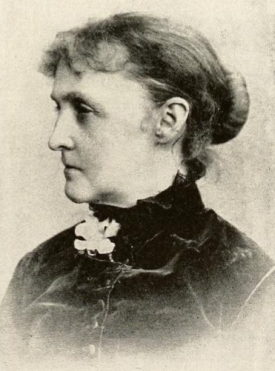
Hearing the Battle
July 21, 1861
One day in the dreamy summer,
On the Sabbath hills, from afar
We heard the solemn echoes
Of the first fierce words of war.
Ah, tell me, thou veilèd Watcher
Of the storm and the calm to come,
How long by the sun or shadow
Till these noises again are dumb.
And soon in a hush and glimmer
We thought of the dark, strange fight,
Whose close in a ghastly quiet
Lay dim in the beautiful night.
Then we talk’d of coldness and pallor,
And of things with blinded eyes
That stared at the golden stillness
Of the moon in those lighted skies;
And of souls, at morning wrestling
In the dust with passion and moan,
So far away at evening
In the silence of worlds unknown.
But a delicate wind beside us
Was rustling the dusky hours,
As it gather’d the dewy odors
Of the snowy jessamine-flowers.
And I gave you a spray of the blossoms,
And said: “I shall never know
How the hearts in the land are breaking,
My dearest, unless you go.”
Sarah Morgan Bryan Piatt
(1836–1919)
Hearing the Battle.
(July 21, 1861)
Poem
• fleursdumal.nl magazine
More in: # Classic Poetry Archive, #Editors Choice Archiv, *War Poetry Archive, Archive O-P, Archive O-P, WAR & PEACE

“Alone—together”
I
Alone, I see the sunrise, from the rocks above the sea;
And the hamlet flushed with rosy light, seems fairy-land to me:
There dwells the pilot’s daughter, whose dear love I’d die to win;
And the blue sky fills my heart with hope, while the merry tide flows in.
II
’Tis noon—we stand together, on the sands beside the sea;
And the maiden, folded to my heart, is sworn my bride to be!
In the sunshine flash the sea-gulls, skimming waves of rippled light;
The fisher boats ride gaily, under cliffs of dazzling white.
III
Alone, I see the sunset, from the churchyard near the sea,
For the cruel grave-stone at my feet, hides my darling’s face from me!
Like some dark pall, the sea-weeds droop from ledges cold and grey;
The night-mists shroud the hamlet, and the tide ebbs fast away!
Evelyn Forest
(Pen name of Anne Pares)
(? – ?)
“Alone—together”
Illustration: Frederick Eltze (1836–1870)
• fleursdumal.nl magazine
More in: # Classic Poetry Archive, Archive E-F, Archive E-F, Archive O-P, Archive O-P

Paradis est plus fleuri que printemps.
Paradis est plus moissonneux qu’été.
Paradis est plus vendangeux qu’automne.
Paradis est si éternel qu’hiver.
Paradis est plus soleilleux que jour.
Paradis est plus étoilé que nuit.
Paradis est plus ferme que le ferme décembre.
Paradis est plus doux que le doux mois de mai.
Paradis est plus secret que jardin fermé.
Paradis est plus ouvert que champ de bataille.
Paradis est plus vieux que saint Jérôme.
Paradis est le céleste pourpris.
Paradis est plus capital que Rome.
Paradis est plus peuplé que Paris.
Paradis est désert plus que plaine en décembre.
Paradis est public et qui veut vient y boire.
Paradis est plus frais que l’aube fraîche.
Paradis est plus ardent que midi.
Paradis est plus calme que le soir.
Paradis est si éternel que Dieu.
Paradis est sanglant plus que champ de bataille.
Paradis est sanglant du sang de Jésus-Christ.
Paradis est royaume des royaumes.
Paradis est le dernier reposoir.
Paradis est le siège de Justice.
Paradis est le royaume de Gloire.
Paradis est plus beau qu’un jardin de pommiers.
Paradis est plus floconneux qu’hiver.
Paradis est plus sévère que mars.
Paradis est plus boutonneux qu’avril.
Paradis est plus bourgeonneux qu’avril.
Paradis est plus cotonneux qu’avril.
Paradis est plus embaumé que mai.
Paradis est plus accueillant qu’auberge.
Paradis est plus fermé que prison.
Paradis est demeure de la Vierge.
Paradis est la dernière maison.
Paradis est le Trône de Justice.
Veuille seulement Dieu que route y aboutisse.
Route que cheminons depuis dix-huit cents ans.
Paradis est auberge à la très belle enseigne.
Car c’est l’enseigne-ci : à la Croix de Jésus.
Cette enseigne éternelle est pendue à la porte.
Charles Péguy
(1873 - 1914)
Le Mystère des Saints-Innocents
(1912)
• fleursdumal.nl magazine
More in: # Classic Poetry Archive, Archive O-P, Archive O-P, Peguy, Charles, WAR & PEACE
English poet Estill Pollock’s new collection is an ARK built to weather the flood of 21st century life.
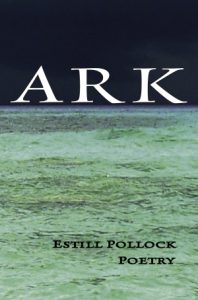 “I have nothing left / To offer, except this poem,” Estill Pollock declares around the midpoint of his new collection ARK, and for anyone else this might seem an apology or lament; but Pollock’s poems encompass multitudes, and offer the reader entire worlds. His title of course suggests both a means of safety and sanctuary (the title of one section here), as well as a repository of sacred texts, and both are apt descriptions for this volume.
“I have nothing left / To offer, except this poem,” Estill Pollock declares around the midpoint of his new collection ARK, and for anyone else this might seem an apology or lament; but Pollock’s poems encompass multitudes, and offer the reader entire worlds. His title of course suggests both a means of safety and sanctuary (the title of one section here), as well as a repository of sacred texts, and both are apt descriptions for this volume.
His hierophantic language demands much from the reader, but rewards in equal measure, and pleasure. His scope ranges over time and space, “in data streams / Of stars,” from “Neanderthals in Paris” to “AI execution codes” and “Cryptocurrency blockchain” carrying us over rising tides of (literal) water and war and all manner of floods that threaten to engulf us. A long account of “London in those times / Of empire” makes up much of the middle section; and even though it has been decades since he left his native America he devotes specific attention to its problematic history, and present. “Mason-Dixon” recounts the Original Sin of slavery, while more recently he observes how “American democracy eats / Its young—pockets emptied to Big Pharma / Big Banks, murder-cop trials, neo-Nazi podcast / Or demagogue variant QAnon.”
“Old worlds give up their dead,” he observes, “a skull / In tidal mud, looted barrows, souvenirs / Of species an archived fidelity, as though / We were disappearing from our own lives.” But Pollock’s ARK is here to preserve us. “This is about everything, and nothing” – in which respect it perfectly resembles life.
Estill Pollock’s publications include Constructing the Human (Poetry Salzburg, 2001) and the book cycle Relic Environments Trilogy (Cinnamon Press, Wales, 2012). His recent poetry collections, ENTROPY (2021) and TIME SIGNATURES (2022), are published by Broadstone Books. He lives in Norfolk, England.
Ark
by Estill Pollock
Pub Date: 8/15/2023
Publisher: Broadstone Books
ISBN 978-1-956782-43-1
Binding: PAPERBACK
Pages: 92
Price: $ 26.00
• fleursdumal.nl magazine
More in: #Editors Choice Archiv, - Book News, - Bookstores, Archive O-P, Archive O-P
Finalist for the 2023 Pulitzer Prize Listed in The Boston Globe’s Best Poetry Books of 2022.
Longlisted for the PEN/Voelcker Award in PoetryAmerican Book Award-winning poet dg okpik’s second collection of poems, Blood Snow, tells a continuum story of a homeland under erasure, in an ethos of erosion, in a multitude of encroaching methane, ice floe, and rising temperatures.
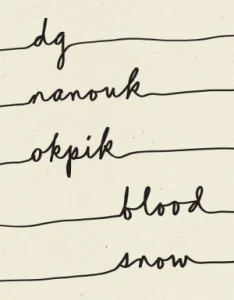 Here, in a true Inupiaq voice, dg okpik’s relationship to language is an access point for understanding larger kinships between animals, peoples, traditions, histories, ancestries, and identities.
Here, in a true Inupiaq voice, dg okpik’s relationship to language is an access point for understanding larger kinships between animals, peoples, traditions, histories, ancestries, and identities.
Through an animist process of transfiguration into a Shaman’s omniscient voice, we are greeted with a destabilizing grammar of selfhood. Okpik’s poems have a fraught relationship to her former home in Anchorage, Alaska, a place of unparalleled natural beauty and a traumatic site of devastation for Alaskan native nations and landscapes alike. In this way, okpik’s poetry speaks to the dualistic nature of reality and how one’s existence in the world simultaneously shapes and is shaped by its environs.
dg nanouk okpik was born and spent much of her life in Anchorage, Alaska. She graduated from Salish Kootenai College with an AFA in Liberal Arts and Liberal Studies, and later attended the Institute of American Indian Arts, graduating with an AFA and a BFA in Creative Writing before receiving her MFA in Creative Writing from Stonecoast College. okpik has won the Truman Capote Literary Award, the May Sarton Award, and an American Book Award for her first book, Corpse Whale (University of Arizona Press, 2012).
Blood Snow
by Dg Nanouk Okpik
Publisher: Wave Books
Publish Date: October 18, 2022
Pages 96
Language: English
Paperback
EAN/UPC: 9781950268634
BISAC Categories:
Native American
Women Authors
Price $18.00
• fleursdumal.nl magazine
More in: #Archive Native American Library, #Editors Choice Archiv, #Modern Poetry Archive, - Book News, - Bookstores, Archive O-P, Archive O-P

The Seasons
Spring—and her heart is singing
A song full of joyous cheer;
For each brightening day seems bringing
The hope of her life more near.
Summer—her heart is waiting;
Its dream is yet unfulfilled:
But her trust knows no abating,
Though the Spring’s glad song is stilled.
Autumn—her heart is burning
With the fever of restless fears;
And the darkened days returning
Bring her no relief save tears.
Winter—her heart is broken:
The struggles of Hope are o’er;
But the love that was here unspoken
Will be hers where hearts bleed no more.
Evelyn Forest
(Pen name of Anne Pares)
(? – ?)
The Seasons (1862-63)
Illustration: Frederick Eltze (1836–1870)
• fleursdumal.nl magazine
More in: # Classic Poetry Archive, Archive E-F, Archive E-F, Archive O-P, Archive O-P, Natural history

Song
What can it mean?—that glance so tender,
Out of the depths of two soft dark eyes;
Can it be earnest of heart-surrender,
Making me blest with a sweet surprise?
What can it mean?—white hands caressing
Between them a hand that is scarred and brown:
Is it a dream?—two soft lips pressing
That hard rough hand while the tears fall down.
What can it mean?—you kneel beside me,
Laying your dear head upon my breast,
Giving me all that you once denied me!
Is it, sweetheart, is it love confessed?
Evelyn Forest
(Pen name of Anne Pares)
( …-… unknown)
Song
Illustration: Frederick Eltze (1836–1870)
• fleursdumal.nl magazine
More in: # Classic Poetry Archive, Archive E-F, Archive E-F, Archive O-P, Archive O-P
Thank you for reading Fleurs du Mal - magazine for art & literature